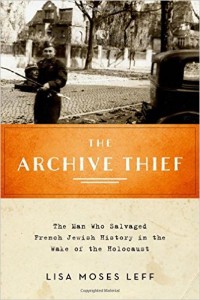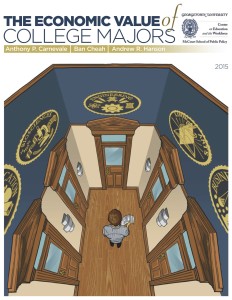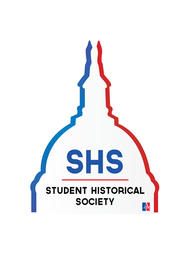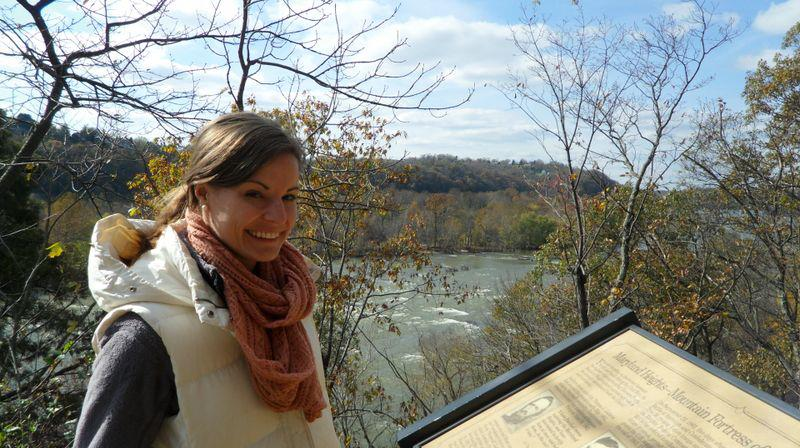In her new book, Islamic Law, Gender and Social Change in Post-Abolition Zanzibar (Cambridge University Press, 2015), Elke Stockreiter analyzes the transformation of Zanzibar’s Islamic judiciary under British colonial rule from 1890 to 1963. In particular, she explores the ways in which socially marginalized groups—women and former slaves, for example—managed to engage Islamic courts to pursue their own diverse interests and agendas. Prof. Stockreiter’s work at AU has already been the subject of one feature article. Now, in this video interview, fellow AU History Dept. professor Justin Jacobs speaks with Stockreiter about some of the more comparative and thematic aspects of her research.
Author: auhistorydept
Lisa Leff’s Archive Thief Stealing the Spotlight
AU History Professor Lisa Leff’s new book, The Archive Thief: The Man Who Salvaged French Jewish History in the Wake of the Holocaust (Oxford, 2015), is receiving widespread critical and popular acclaim. In it, Leff tells the fascinating and complex story of Zosa Szajkowski (Shy-KOV-ski), a Jewish refugee from Poland—and later France—who alternately collected and stole valuable documents concerning Jewish history from institutions and archives throughout Europe. Leff’s sensitive grasp of the moral and political dilemmas confronting a man like Szajkowski has been enthusiastically profiled in the New York Times, Washington Post, Jewish Daily Forward, and American Jewish World. (An informative and accessible AU article also explores the main themes of the book.) In addition to print media, Leff has also discussed the writing of her book in online podcasts (Vox Tablet), radio interviews (NPR), and even a popular blog (Wonders and Marvels). She has also “dreamcasted” possible actors who could play Szajkowski in a feature film (spoiler alert: it’s Joaquin Phoenix!).
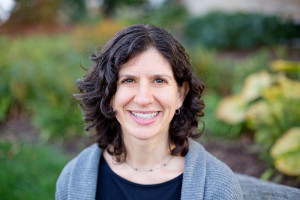
Now, in this short video interview, fellow AU History professor Justin Jacobs sits down with Prof. Leff to discuss some of the larger historical issues raised by The Archive Thief. In particular, they talk about those aspects of Szajkowski’s career that evoke similar themes in the history of modern archaeology in China and the Middle East, the subject of Jacobs’s current research.
History Majors Top Wages Among Humanities
A recent study by Georgetown University’s Center on Education and the Workforce found that “among humanities and liberal arts majors, history majors have the highest annual wage” (p. 93). Approximately one in five humanities and liberal arts majors choose to study history, surpassed only by English. The full report, “The Economic Value of College Majors,” is available here.
Student Historical Society Events
The following events are organized and sponsored by the Student Historical Society (SHS) at AU. For more information about the Student Historical Society, send an email to studenthistoricalsociety@gmail.com or check us out on Facebook.
First General Meeting: To learn more about our club and the many events we have planned for the semester, please join us on Tuesday, September 15 at 8PM. Location: TBD.
Research Tutorial: Join the Student Historical Society in a research tutorial led by Librarian Olivia Ivey to learn more about the research tools offered through the AU library. The event will be held Tuesday, October 6, at 8PM in the Training and Events Room on the first floor of the Library.
History Trivia Night: Join the Student Historical Society for a night of trivia, food, and prizes, where teams of up to five students may compete for the title of history trivia champions.
Additional Events Include: Movie Night: Suffragette, Game Night: History Board Games, and a group tour of Ford’s Theatre.
Check out our
Summer 2015 course gallery!
Student Spotlight: Julie Rogers
We had the pleasure of chatting with second year public history MA student Julie Rogers about her experiences both in and out of the classroom. Julie hails from Wisconsin, completed her bachelors at the University of Wisconsin, and worked at the Atlantic before joining the program in fall 2013. She is set to graduate this summer with her public history degree and may be moving on to a history PhD.
History was always my favorite subject in school because I loved to read and to use my imagination. As an undergraduate student, I fell in love with history all over again. I had the opportunity to do primary source research at archives including the Wisconsin State Historical Society and the African Studies Library at the University of Cape Town. I love holding a piece of the past in my hands and asking questions about its meaning and significance.
Since you worked for several years between undergrad and grad, what about your work experience helped you in grad school and what was difficult about being back in the classroom?
I worked in publishing for several years between undergrad and grad school. Going back to school was a big adjustment at first. I had to re-familiarize myself with everything from late-night studying sessions to academic writing. But I think that my professional skills and experience prepared me very well for graduate school, especially for tasks outside of the classroom like time management and networking.
What did you learn about public history that you didn’t expect when you started?
I was surprised by the sheer breadth of the field. Public historians work in museums, libraries, archives, but they also are historic preservationists, artists, costumed interpreters, performers, and community activists. In my opinion, this is what makes public history so exciting.
Which course has been the most influential?
My first semester I took a course called The Historian’s Craft with Professor Eileen Findlay. The class was a chance to reflect on the craft and practice of history and to build a community of scholars. It was a great introduction to the program.
What has been the highlight of your time at AU?
As a Public History Fellow at the White House Historical Association, I had the chance to visit the White House and shake hands with First Lady Michelle Obama. She even asked me about public history!
What do you plan on doing next?
I hope to earn a PhD and work as a curator or historian at a cultural institution here in Washington, D.C.
What advice do you have for people considering a degree in public history?
My academic studies at AU have been greatly enhanced by my work outside of the classroom. In the past year and a half, I have worked with the National Archives, the National Park Service, the Library of Congress, and the White House Historical Association. So be prepared to get off campus and make the most of the fabulous opportunities here in D.C.
What is your favorite movie that portrays an historical moment?
I have to go with Back to the Future. It might not seem like a “history” movie, but it makes brilliant use of material culture in the scenes set in 1955. It also makes me think about the portrayal of the past and about the difference between ‘what happened’ and ‘what we say happened.’ Also, I love anything related to time-travel.
Check out our
Spring 2015 course gallery!
